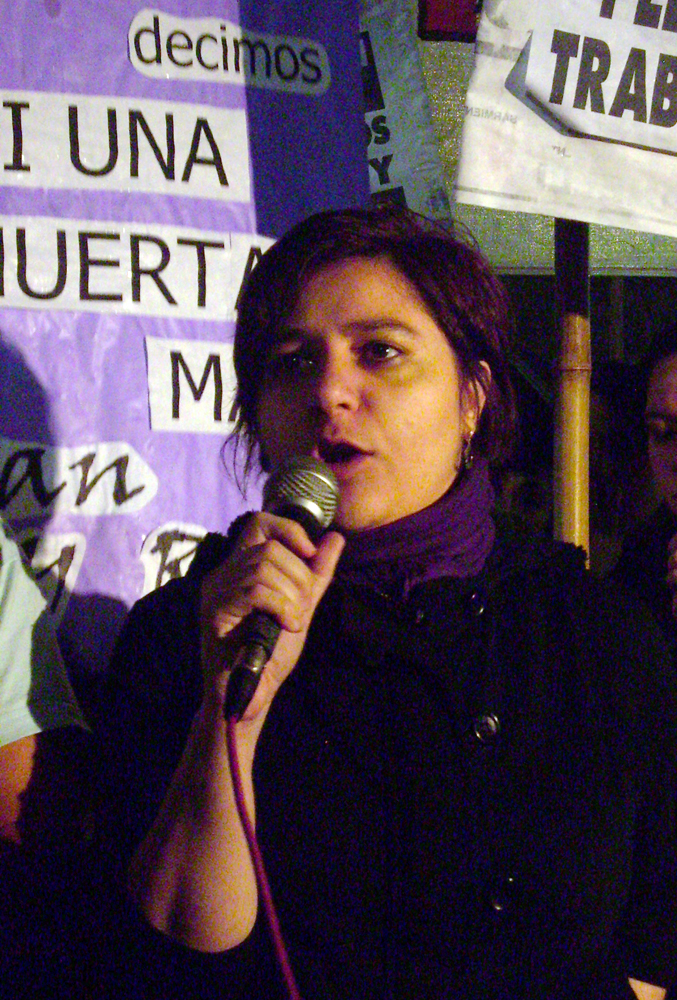International Women's Day in Argentina
Wladek Flakin | 09.03.2010 09:17 | Gender | Social Struggles | World

"Pan y Rosas" and other groups of the radical left are organizing a demonstration in front of the congress. At the final rally at the Plaza de Mayo, women who played a leading role in recent workers' struggles will speak. For example, a woman from the newly-elected workers' commission in the largest food factory in the country, "Kraft-Terra Bussi", will speak, and also a woman from the factory "PepsiCo Snacks."
- What is the group "Pan y Rosas", in English "Bread and Roses"?
We are a women's organization that was founded in 2003. Back then we were only 30 comrades, mostly from the university. Now we have more than 1,000 members in 14 cities, including a majority of working women and housewives. We are the largest left-wing women's organization that has ever existed in Argentina. We are fighting for the right to abortion – free and without restrictions –, for an end to violence against women and for the rights of working women. Our fundamentals are independence from the state and the bosses' parties, anticapitalism and socialist revolution.
- The bourgeois press is celebrating the "woman President effect" ("efecto presidenta"), i.e. the election of Cristina Fernández de Kirchner, as a step forward for women. How do you see it?
Kirchner was campaigning at the same time as Michelle Bachelet in Chile, Ségolène Royal in France and Hillary Clinton in the US. She promised "a century of women." Many feminists thought that the election of a woman president would automatically lead to our demands being met. For example, the demand for the right to abortion – although Kirchner had spoken out repeatedly against this right, even in the Vatican. The "woman President effect" consists, in my view, in the demobilization of the women's movement, which has tied itself to the government.
- The right to abortion is very limited in almost all Latin American countries. What is the situation like in Argentina?
Polls show that 80 percent of the population support the right to abortion in certain cases, for example in the case of rape. 70 percent are for the unconditional right to abortion. But the law here, dating back to 1913, allows abortion only if the woman is "demented" or "idiotic"!
Every year there are nearly 500,000 clandestine abortions – compared with 700,000 births. For women who have money, there are illegal clinics. The surgery is expensive there, because politicians and police officers have to be bribed to look the other way. But for poor women, there are no doctors, at most nurses or midwives, sometimes using barbaric methods. It is estimated that each year between 300 and 400 women die from the consequences of clandestine operations.
To this day, the Catholic Church blocks sex education in schools. We call for "contraceptives so we don't have to abort, and abortions so we don't die."
- What is the situation of working women in Argentina?
54% of the women who work in this country are in the informal sector, which means they lack basic rights. But in the growing movement of "rank-and-file trade unionism" ("sindicalismo de base"), women are playing an important role. For example in the food factories which I mentioned at the beginning, women make up about 70 percent of the workforce. In a strike at "Kraft-Terrabussi" in August and September of last year, women were on the front line. During the swine flu epidemic, they had called for better hygiene measures, especially because there is a daycare in the plant. The company used these protests as an excuse to lay off about 150 activists, including virtually all the workforce's delegates. This was answered by a strike lasting more than four weeks – and the majority of the layoffs had to be withdrawn.
- What is the international work of Pan y Rosas" like?
We have sister groups in Brazil, Chile, Bolivia and Mexico. After the disaster in Haiti, we published a statement signed by more than 200 feminists from all over Latin America. We demand the withdrawal of imperialist troops and the UN, because they not only carrying out the recolonialization of the island in the name humanitarian aid, but are also responsible for all kinds of violence against Haitian women. The humanitarian aid should be financed from the profits of multinational corporations – and then distributed by the of organizations of women, workers and students of Haiti. Furthermore, we demand the immediate canceling of the foreign debt of the island.
Pan y Rosas: www.pyr.org.ar (in Spanish)
Photos of the Women's Day in Buenos Aires:
 http://www.flickr.com/photos/onesolutionrevolution/sets/72157623584135012/
http://www.flickr.com/photos/onesolutionrevolution/sets/72157623584135012/ Interview: Wladek Flakin, Buenos Aires - RIO, the Revolutionary Internationalist Organization (
 http://www.onesolutionrevolution.org)
http://www.onesolutionrevolution.org)
Wladek Flakin
 Homepage:
http://www.onesolutionrevolution.org
Homepage:
http://www.onesolutionrevolution.org